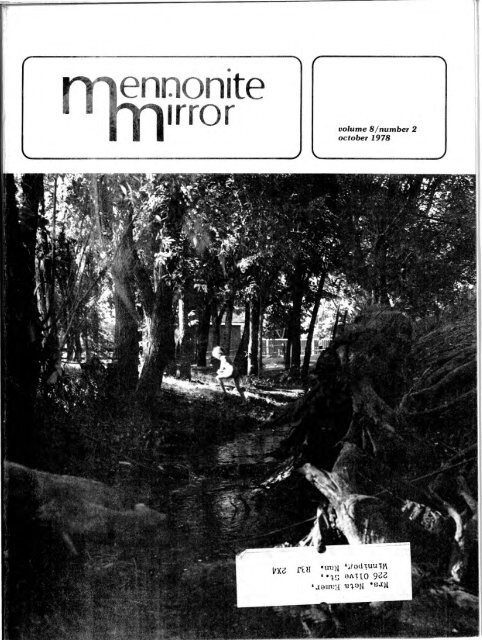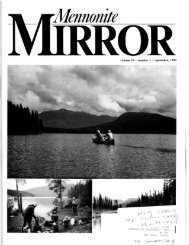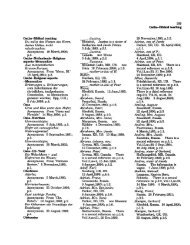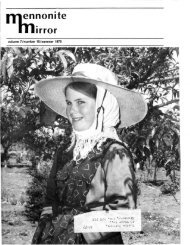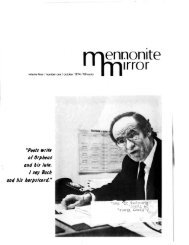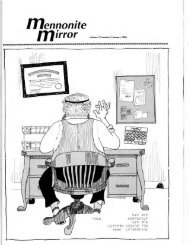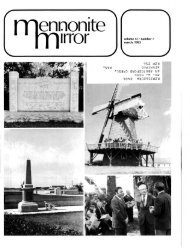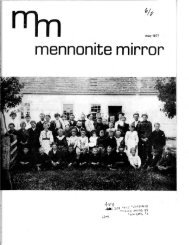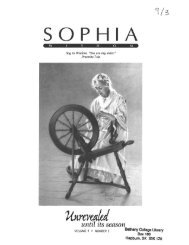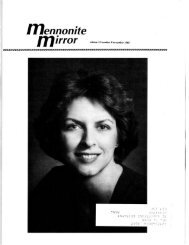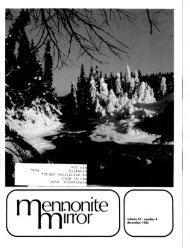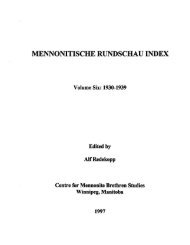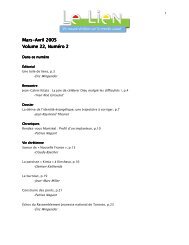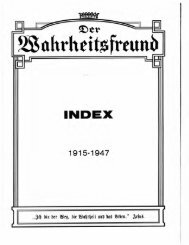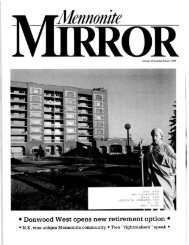No. 2 - Canadian Conference of Mennonite Brethren Churches
No. 2 - Canadian Conference of Mennonite Brethren Churches
No. 2 - Canadian Conference of Mennonite Brethren Churches
Create successful ePaper yourself
Turn your PDF publications into a flip-book with our unique Google optimized e-Paper software.
LEITER FROM THE PUBLISHER:<br />
According to good biblical tradition, life should be seen as a<br />
series <strong>of</strong> cycles-consisting <strong>of</strong> growth, maturity, and renewal.<br />
The seven year cycle is especially favored. Organizations, and<br />
people, should be open to renewal at least every seven years.<br />
The <strong>Mennonite</strong> Mirror is trying to observe this tradition.<br />
This summer we completed seven years <strong>of</strong> publication under<br />
one editor and a stable corps <strong>of</strong> writers and business<br />
associates. There is much to be said in favor <strong>of</strong> such stability.<br />
In the publishing field, indeed, it is quite remarkable. But<br />
there is also something to be said in favor <strong>of</strong> change. A fresh<br />
breeze can lift the spirit.<br />
We are pleased to introduce, with this issue <strong>of</strong> the Mirror, a<br />
fresh breeze to our readers. Dr. AI Reimer, who is known to<br />
many <strong>of</strong> you through his numerous articles and reviews (and<br />
through his highly successful translation <strong>of</strong> The Russian Dance<br />
<strong>of</strong> Death) has agreed to become the editor <strong>of</strong> the <strong>Mennonite</strong><br />
Mirror. We welcome him to this position. You can be sure that<br />
he did not seek this dubious honor. Some have greatness<br />
thrust upon them-and thrust we did! Al is uniquely qualified<br />
to retain for the Mirror any <strong>of</strong> the virtues that it has<br />
developed Qver the years, and to lead it to new ones. Despite<br />
his origins in the East Reserve, in Steinbach, he is open to<br />
<strong>Mennonite</strong>s on both sides <strong>of</strong> the Red River. He now lives on<br />
the West side. Though he is a product <strong>of</strong> the 1874 migration he<br />
has never despised those poor <strong>Mennonite</strong>s who arrived 50 or<br />
75 years later.<br />
His literary talents are widely recognized and appreciated.<br />
Biblically oriented<br />
Educationally excellent<br />
Evangelically committed<br />
Interdenominationally concerned<br />
Vocationally directed<br />
SOcially aware<br />
Evangelistically enthused<br />
4/ mennonite mirror/ october 1978<br />
The grass withers,<br />
the flowers fade,<br />
but the Word <strong>of</strong> our God<br />
endures for evermore.<br />
Isaiah 40:8<br />
He has just completed a translation, with considerable reworking,<br />
<strong>of</strong> a novel by Hans Harder <strong>of</strong> Germany, which is to<br />
be published before Christmas. AI is pr<strong>of</strong>essor <strong>of</strong> English at<br />
the University <strong>of</strong> Winnipeg. He is married to the former Joan<br />
Frederick and they have three children, Cindy, Mark and<br />
Curt. Al is the son <strong>of</strong> the well known minister and <strong>Mennonite</strong><br />
scholar Rev. P.J.B. Reimer.<br />
Al will share editorial responsibilities with a number <strong>of</strong> long<br />
time staff members. Ed Unrau as managing editor will<br />
continue to be responsible for all technical aspects <strong>of</strong> the<br />
magazine. Ruth Vogt, as associate editor, is responsible for the<br />
editing and co-ordination <strong>of</strong> all editorial material. Elisabeth<br />
Schlichting will continue to be the editor . in charge <strong>of</strong> the<br />
German section. Our good and loyal staff <strong>of</strong> writers will<br />
continue to function as in the past, though a few additions are<br />
planned. As publisher I will continue to be responsible for the<br />
over all direction <strong>of</strong> the magazine and will share with AI and<br />
the other editors the responsibility for writing our monthly<br />
editorial column.<br />
Finally, we are pleased that these changes are being made<br />
at a time when the MM has achieved a fairly stable footing.<br />
The financial situation is always somewhat precarious but<br />
generous support from our readers and members <strong>of</strong> the<br />
business and pr<strong>of</strong>essional communities are helping us not only<br />
to maintain but to improve our publication. We will continue<br />
to welcome your letters and your articles and look forward to<br />
the changes that our new editor will bring.<br />
Sineerely. Roy Vogt<br />
Winnipeg Se.lnary I. dedicated to the only two thing.<br />
which la.t forever. people and the Word <strong>of</strong> God.<br />
Everything el.e I. progra •• ed for de.tractlon.<br />
We believe<br />
' . "It'. e.peclaU" appropriate<br />
that .cholan be Involved<br />
In helping fulflU<br />
deaa.' Co •• 18.lon."<br />
Winnipeg Theological Seminary I<br />
Otterburne, Manitoba ROA IGO
A savage way to while away<br />
a sunny sUDlDler's day<br />
By Mary M. Enns<br />
A man, just about any man, can kill a<br />
perfect summer's day just by making one<br />
<strong>of</strong> his famous suggestions. "Let's jack up<br />
that front corner <strong>of</strong> our garage today. Its<br />
been sagging for months, and now I can't<br />
open or close the little side door!"<br />
This sort <strong>of</strong> fun-thing is adrenalin to his<br />
blood-stream. It sets his ears a-twitching<br />
with the anticipated adventure in it. As<br />
for me, it makes me wonder, seriously,<br />
why I didn't marry an honest-to-goodness<br />
carpenter, or building-raiser.<br />
<strong>No</strong>w begins the scrounging around for<br />
the right beams in the rafters <strong>of</strong> the<br />
garage. <strong>No</strong>t finding the required ones<br />
merely adds to his unadulterated pleasure<br />
<strong>of</strong> the project. "We will make do<br />
with what we've already got here" (have<br />
had lying around for the last twenty<br />
dusty years). A great deal <strong>of</strong> activity <strong>of</strong><br />
measuring, sawing and nailing now begins.<br />
Watching from the bleachers I<br />
notice, but wisely say nothing, that an<br />
enormous crack had developed on the<br />
under side <strong>of</strong> the lower beam. I admit to<br />
relief, thinking that it's the end to all this<br />
ghastly nonsense. Wrong! Himself is but<br />
fired toward further incentiveness. The<br />
tool chest and the miscellaneous nail, bolt<br />
and screw box spew forth the suitable<br />
bolts and in no time at all the beam is<br />
ready for service. I sneak indoors, but am<br />
recalled by the diplomat: "Dear, we work<br />
so well together, do you think you might<br />
like to just lend a pretty little hand<br />
here?" (suddenly I have pretty hands) I<br />
pale at the sight <strong>of</strong> what lies before us,<br />
since I am now partner to the horrible<br />
plan. "How is it that you're always<br />
embarrassed to ask a neighbour or a<br />
friend to give you a hand with these<br />
<strong>Mennonite</strong> finds calling<br />
to United Church pulpit<br />
by AI Unrau<br />
Many people have asked me and perhaps<br />
many more have wondered-just<br />
what does a <strong>Mennonite</strong> like me do<br />
serving a United Church? I am happy to<br />
reflect a bit on this loaded question.<br />
First <strong>of</strong> all I must admit that I'm rather<br />
surprised to be where I am. It was not a<br />
long standing plan or desire <strong>of</strong> mine to<br />
become a minister in the United Church<br />
<strong>of</strong> Canada. Frankly, I had never given it<br />
any thought until some eight years ago<br />
when a United Church minister said to<br />
me, "AI you would make a heck <strong>of</strong> a good<br />
United Church minister." On the other<br />
hand it is quite likely true that a great<br />
number <strong>of</strong> us are doing things that, so to<br />
speak, "were not in the cards a few<br />
decades ago."<br />
Just what do I feel best about serving<br />
in the United Church? Here is my answer<br />
to that query, which has not changed<br />
during the six years <strong>of</strong> service. I am able<br />
and indeed I am encouraged to share the<br />
Gospel <strong>of</strong> Jesus Christ honestly, freely<br />
and forthrightly. The other side <strong>of</strong> this<br />
coin is the reality that we have been<br />
consistent and genuine response to the<br />
sharing <strong>of</strong> the good news about Jesus<br />
Christ.<br />
When I went into the United Church<br />
ministry one <strong>of</strong> my brothers said to me,<br />
"when you go into that worldly church all<br />
your children will go to the dogs." To the<br />
glory <strong>of</strong> God I am able to say that each<br />
one <strong>of</strong> my children (ages 22,20,16,14) are<br />
committed Christians. Furthermore, they<br />
are all doing their things in sharing the<br />
good news <strong>of</strong> the Gospel in their environment.<br />
The middle two were baptized in<br />
the United Church, one by pouring and<br />
the other by immersion. The youngest<br />
will, according to plans, be baptized in<br />
Lake Errock east <strong>of</strong> Mission this coming<br />
August. It is most rewarding to see your<br />
own children take active roles in the<br />
work and life <strong>of</strong> the church in which you<br />
serve as the pastor.<br />
As a <strong>Mennonite</strong>, which means that I am<br />
a Pacifist. I am respected as a leader in<br />
the United Church. I was . never asked,<br />
neither would I have considered giving<br />
up or watering down my convictions and/<br />
or moorings as a peace loving person.<br />
My social roots <strong>of</strong> caring and trying to<br />
live a simple life are very precious to me.<br />
I can candidly say that my shift into the<br />
United Church has deepened by appreciation<br />
for my religious and social backcontinued<br />
overleaf<br />
herculean tasks but are never shy to seek<br />
help from a frail female?"<br />
This was the wrong approach, it seems.<br />
With icy dignity: "Forget I asked. I'll do<br />
it on my own." Why does one then fairly<br />
cringe with guilt and shame? All I know<br />
is, they know exactly how to get free,<br />
yea eventually eager labour. With alacrity<br />
I am forgiven and reinstated.<br />
"<strong>No</strong>w, then, all that is required <strong>of</strong> you<br />
is to do exactly as you're told. Here you<br />
are. I've pushed this beam under this<br />
corner bar. You hold down that other<br />
free end while I . . ." "and what if it<br />
breaks (I alone appear to have the<br />
necessary foresight) and the whole garage<br />
comes crashing down on us?" Instant<br />
defensive reaction. "Oh, don't always be<br />
so afraid that you're going to be maltreated."<br />
"Well, actually, it wasn't so much fear<br />
<strong>of</strong> maltreatment that I was concerned<br />
with. It's fear <strong>of</strong> being killed outright,<br />
thereby robbing my loved ones <strong>of</strong> something<br />
very precious to them." <strong>No</strong> answer.<br />
I take to muttering "How come we don't<br />
hire a pr<strong>of</strong>essional to come and set our<br />
garage straight?"<br />
Too late, almost, I realized that a<br />
remark like that could have cost me my<br />
job. (Oh, would that it had!) Stiffly and<br />
tensely I hold down the beam with all the<br />
power invested in me. Then, to my<br />
horror, I see the boss leave his station,<br />
turn around and with a whistle walk out<br />
<strong>of</strong> the garage for more beam equipment.<br />
Left thus alone I must decide on my own<br />
whether the situation merits a heart<br />
attack brought on by sheer fright, righteous<br />
anger resulting in dropping my end<br />
<strong>of</strong> the bargain or stoical, pioneer-type<br />
stick-to-itveness to bring this business to<br />
an end.<br />
I decide on the latter just as the beam<br />
on Simon Legree's shoulder enters the<br />
garage. With customary tact, or is it<br />
fury, I am silent. <strong>No</strong>w, he says, he will<br />
insert, then step on the beam in order to<br />
raise the corner. He does and not too<br />
much happens. He tries half jumping on<br />
it and it does shake a little. I am tempted<br />
to suggest something to the effect that if<br />
he carried a little more weight it might<br />
work. Again, I wisely desist, knowing full<br />
well that his gentle rejoinder would be a<br />
fitting if unflattering one.<br />
Just as the apprentice feels an irresistible<br />
urge to scratch in the back <strong>of</strong> the<br />
neck with no free hands there is an ugly<br />
crunch and the beam splits and breaks.<br />
Realizing that this drama could go on<br />
indefinitely, I promise him, who is working<br />
so hard, the moon if only the project<br />
might be shelved for today since its<br />
almost time for the 6 o'clock news.<br />
Unbelievably and, with grace, he concedes.<br />
He smiles (and that's why I will<br />
help him whenever he asks me, as long as<br />
it isn't tomorrow) and says, "Well, how<br />
about we call it a day then?"<br />
I keep my promise and go and make<br />
him moon-shaped baking powder biscuits.<br />
mm<br />
mennonite mirror/october 1978/9
ground.<br />
What I am actually doing in the United<br />
Church ministry is to work at relating the<br />
Gospel <strong>of</strong> Christ to the problems and<br />
situations <strong>of</strong> modern man. For example<br />
our church has a caring ministry for<br />
handicapped children as well as a new<br />
ministry for home-bound seniors. For the<br />
past four years we worked very hard at<br />
creating 90 units <strong>of</strong> Co-Op housing for<br />
persons 50 years and over. This completed,<br />
St. Andrews Place opened its doors this<br />
past May 1st.<br />
l Our Sunday school is growing (from 25<br />
\ in 1972 to 100 students in 1978) and it is<br />
both a Bible place as well as being a Fun<br />
place. We are very pleased to have more<br />
and more parents involved in the operation<br />
<strong>of</strong> the Sunday school.<br />
Our youth group that was non-existent<br />
five years ago is currently an active<br />
involved bunch <strong>of</strong> late and early teens <strong>of</strong><br />
around 12 who love to study the Bible<br />
and then go about loving and caring for<br />
senior citizens. They are also involved in<br />
various other projects, such as raising<br />
money to purchase new doors for the<br />
sanctuary.<br />
In addition to the more or less traditionalll<br />
a.m. worship hour there emerged<br />
about three years ago a 9:30 worship<br />
event. In this very informal service the<br />
sermon is generally a dialogue between<br />
the people and the pastor.<br />
When we discovered about a year ago<br />
l<br />
lO/mennonite mirror/ october 1978<br />
Compliments <strong>of</strong><br />
that the niece and nephew <strong>of</strong> one <strong>of</strong> our<br />
members were orphans and stateless in<br />
Malaysia, and had been refused entrance<br />
into Canada, our church went to bat for<br />
these two young people on humanitarian<br />
grounds. The struggle resulted in a<br />
change <strong>of</strong> mind <strong>of</strong> the Department <strong>of</strong><br />
Immigration. On Dec. 30th they arrived<br />
at the Vancouver International Airport.<br />
Soon after their arrival they became<br />
students at the Fraser Valley College in<br />
Abbotsford.<br />
Just what am I doing in the United<br />
Church <strong>of</strong> Canada ministry? I am allowed/<br />
encouraged to be a caring, creative,<br />
effective human being, albeit a minister<br />
<strong>of</strong> the Gospel. mm<br />
MBS CONSTRUCTION<br />
(1977 Ltd.)<br />
•<br />
301 - 1695<br />
Henderson Highway<br />
Tel. 339-2067<br />
INVISIBLE CONTACTS<br />
A woman was stopped for speeding.<br />
The traffic <strong>of</strong>ficer asked to see her<br />
driver's licence. It was a restricted<br />
licence and it read that she must<br />
always wear her glasses while driving.<br />
The <strong>of</strong>ficer, noticing that she was<br />
without glasses, asked: "Where are<br />
your glasses?"<br />
"But <strong>of</strong>ficer," she replied, "I have<br />
contacts."<br />
"I don't care who your friends are,"<br />
the policeman said. ''I'm going to give<br />
you a ticket anyway."
MCC is the church<br />
where two or three<br />
are gathered together<br />
and 700 workers<br />
are scattered apart.<br />
MCC has no pews<br />
but many workers.<br />
<strong>No</strong> pulpit<br />
but many ministers.<br />
<strong>No</strong> Sunday school<br />
but many teachers.<br />
MCC is the church<br />
because you are the church.<br />
MCC exists<br />
because the church is called<br />
to service.<br />
Christs gathered body<br />
sent us first to Russia<br />
then throughout Europe.<br />
Asia. Latin America.<br />
Africa and back<br />
to our Jerusalem-<br />
feeding the hungry<br />
sheltering the destitute<br />
binding up the wounded<br />
and loosing the captives.<br />
Because the church<br />
continues to call us<br />
to victims <strong>of</strong> disaster.<br />
drought and poverty<br />
in 60 lands.<br />
we need your prayers<br />
and support.<br />
Where two or three<br />
<strong>Mennonite</strong> Central Committee<br />
21 South 12th Street<br />
Akron. PA 17501<br />
or<br />
201 -1483 Pembina Highway<br />
Winnipeg. Manitoba R3T 2C8<br />
are scattered in my name. • • •
12/ mennonite mirror/ october 1978<br />
•
MB Church:<br />
Variations<br />
on Unity<br />
by Allan Siebert<br />
· If holding conventions to talk about<br />
, unity guaranteed its presence, the future<br />
<strong>of</strong> Canada and <strong>of</strong> <strong>Canadian</strong> <strong>Mennonite</strong><br />
, <strong>Brethren</strong> probably would, by now, be<br />
secure.<br />
· <strong>Canadian</strong> MB's have taken part in eight<br />
, major conference get-togethers in as<br />
· many months and several considered the<br />
theme <strong>of</strong> unity in the church.<br />
The convention schedule included a<br />
General <strong>Conference</strong> (<strong>No</strong>rth America)<br />
· study conference on eschatology in<br />
January, five provincial conventions in<br />
June, the 67th annual <strong>Canadian</strong> conven-<br />
· tion during the first weekend <strong>of</strong> July at<br />
Three Hills, Alberta, and the triennial<br />
General <strong>Conference</strong> (<strong>No</strong>rth American)<br />
sessions in Buhler, Kansas in early<br />
August.<br />
The <strong>Canadian</strong> <strong>Conference</strong> gathering in<br />
Three Hills proved to be more a celebration<br />
<strong>of</strong> than a quest for "Oneness in the<br />
Believers' Church" (the convention<br />
theme), despite the expression <strong>of</strong> strong<br />
opinions on several agenda items.<br />
Under the direction <strong>of</strong> moderator P.R.<br />
Toews <strong>of</strong> Winnipeg the 800 delegates and<br />
guests dealt with routine business matters<br />
speedily, but spent a lot <strong>of</strong> time dis-<br />
,cussing resolutions on the use <strong>of</strong> alcohol,<br />
divorce and remarriage and questions <strong>of</strong><br />
denominational identity.<br />
The latter issue rose out <strong>of</strong> a paper on<br />
"The <strong>Mennonite</strong> <strong>Brethren</strong> Church as a<br />
Believers' Church: Past, Present and<br />
Future," by John Redekop <strong>of</strong> Waterloo,<br />
Onto Redekop traced the distinctives <strong>of</strong><br />
the believers' church tradition and exam-<br />
! inedhow <strong>Mennonite</strong> <strong>Brethren</strong> fit into it.<br />
The location <strong>of</strong> the Missions/Services<br />
/ headquarters was a delicate subject at<br />
, both the Three Hills and Buhler, Kansas<br />
sessions. Since the second major MB<br />
General <strong>Conference</strong> institution, the Seminary,<br />
is firmly set in the United States,<br />
general agreement seems to be develop-<br />
· ing that the missions <strong>of</strong>fices should relo-<br />
· cate from Hillsboro, Kansas to an urban<br />
setting in Canada, with Winnipeg as the<br />
likely site. The matter was referred to a<br />
· study commission.<br />
Reports at both conventions-Buhler<br />
· and Three Hills-indicated that <strong>Mennonite</strong><br />
<strong>Brethren</strong> are in the midst <strong>of</strong> an<br />
· unprecedented book publishing spree.<br />
Biographies <strong>of</strong> church leaders, curriculum<br />
· materials and histories <strong>of</strong> MB mission<br />
• efforts are in the works. A major achieve<br />
· ment in 1978 was the publication <strong>of</strong> an<br />
14/mennonite mirror/october 1978<br />
eleven hundred-page English translation<br />
<strong>of</strong> P. M. Friesen's classic, The <strong>Mennonite</strong><br />
Brotherhood in Russia.<br />
The unity to which Christ has called his<br />
church has always been elusive in many<br />
ways "the finding is in the seeking."<br />
<strong>Mennonite</strong> <strong>Brethren</strong> placed several tendentious<br />
issues on the table for discussion<br />
in 1978-and a measure <strong>of</strong> unanimity was<br />
found.<br />
But further tests lie ahead, especially<br />
in the areas <strong>of</strong> denominational identity,<br />
dealing with divorce and remarriage<br />
(many were not completely satisfied with<br />
the Three Hills resolution), and the difficult<br />
matter <strong>of</strong> Canada-U.S. relations in<br />
conference projects, centering on the<br />
possible relocation <strong>of</strong> the Missions/Services<br />
headquarters.<br />
Inspirational input came from the main<br />
convention speaker, Frank C. Peters <strong>of</strong><br />
Waterloo, from rousing singing in the<br />
cavernous wooden Prairie Bible Institute<br />
"Tabernacle," and from testimonies by<br />
new Christians from <strong>Mennonite</strong> <strong>Brethren</strong><br />
<strong>Churches</strong> in Dartmouth, N .S., and Quebec.<br />
The Ste. Rose (Quebec) Church was<br />
one <strong>of</strong> three new churches accepted at<br />
the convention, bringing to five the<br />
number <strong>of</strong> thriving French-speaking MB<br />
churches in Quebec. <strong>Canadian</strong> <strong>Conference</strong><br />
membership topped 20,000 in 1978 for the<br />
first time, it was announced. Giving <strong>of</strong><br />
about $502 per member last year to MB<br />
church-related projects had kept the conference<br />
fmances in relatively good shape.<br />
The ' 1978-79 budget, passed easily,<br />
called for an increase <strong>of</strong> 11.9 percent <strong>of</strong><br />
$696,800 for <strong>Canadian</strong> programs and<br />
$184,900 for General <strong>Conference</strong> programs,<br />
including the Fresno, Calif., MB<br />
Biblical Seminary. <strong>Canadian</strong> MB's also<br />
contributed $1.68 million to <strong>Mennonite</strong><br />
<strong>Brethren</strong> Missions/Services last year.<br />
The announcement that funds had been<br />
raised for a $500,000 addition to the<br />
<strong>Mennonite</strong> <strong>Brethren</strong> Bible College in<br />
Winnipeg seemed to signal a new confidence<br />
in the MBBC's program, after a<br />
decade <strong>of</strong> questions about the school's<br />
future.<br />
An important decision gave the <strong>Canadian</strong><br />
Board <strong>of</strong> Evangelism the green light<br />
to develop a <strong>Canadian</strong> <strong>Mennonite</strong> <strong>Brethren</strong><br />
voluntary service program after MB Missions/Services<br />
terminates its <strong>No</strong>rth<br />
American Christian Service program in<br />
1980.<br />
Subsequent discussion, however, focused<br />
almost entirely on a small section<br />
<strong>of</strong> Redekop's paper in which he asked<br />
whether the "<strong>Mennonite</strong>" label loads too<br />
much ethnic and cultural baggage on a<br />
group that wants to be a genuine believers'<br />
church. To the delegations' surprise, he<br />
then suggested that MB's explore union<br />
with the <strong>Brethren</strong> in Christ. This suggestion<br />
found few takers, but discussion<br />
revealed that strong feelings exist about<br />
the denominational name.<br />
Some felt that dropping the name<br />
<strong>Mennonite</strong> would make church growth<br />
outreach easier. Others felt that the<br />
historical and theological continuity suggested<br />
by the denominational name was<br />
vital.<br />
With no clear direction in view, the<br />
Board <strong>of</strong> Reference and Counsel was<br />
asked to study the matter further.<br />
A resolution which endorsed the traditional<br />
<strong>Mennonite</strong> <strong>Brethren</strong> stance toward<br />
alcoholic beverages-total abstinencepassed<br />
by a large majority after much<br />
discussion.<br />
The resolution stated: "We affirm and<br />
teach the position <strong>of</strong> abstinence from<br />
drinking beverage alcohol as a true<br />
expression <strong>of</strong> our divine calling as disciples<br />
with a responsibility to God and man."<br />
Another resolution to allow the remarriage<br />
<strong>of</strong> divorced persons ("where<br />
there is general agreement in the local<br />
church") also passed, but proved problematic<br />
for many. Several pastors agreed<br />
with the resolution that a marriage<br />
breakdown is "always the result <strong>of</strong> sin<br />
and disobedience," but found no room in<br />
the relevant biblical texts for remarriage.<br />
Review:<br />
Small print<br />
is best<br />
DIE KRIM WAR UNSERE HEIMAT, by<br />
Marin Durksen,' Christian Press, 1977,<br />
$12<br />
Reviewed by Mary M. EDns<br />
In the past few years there bas been a<br />
healthy resurgence <strong>of</strong> interest in their<br />
roots among the <strong>Mennonite</strong>s on this<br />
continent. Considerable research has been<br />
done, older books have been resurrected<br />
and new books have been written, a good<br />
many by individuals or groups <strong>of</strong> people,<br />
concentrating on the <strong>Mennonite</strong>s in specific<br />
areas <strong>of</strong> Russia. Die Krim war unsere<br />
Heimat is one such book. Its author<br />
Martin Durksen hopes that the experiences<br />
recorded here, embellished with<br />
excellent period pictures, will serve to<br />
recall among its readers many <strong>of</strong> their<br />
own experiences. For those <strong>of</strong> us whose<br />
knowledge <strong>of</strong> this past is chiefly hearsay<br />
it is enlightening and educational. For<br />
historians it is yet another addition to the<br />
annals <strong>of</strong> a people who began then, and<br />
are continuing to make their mark among<br />
the peoples <strong>of</strong> the world.<br />
Eric Ratzlaff, Editor-Mennonitische<br />
Rundschau, in his forword says <strong>of</strong> the<br />
book ". . . I was impressed with the rich<br />
historical, cultural and religious content<br />
<strong>of</strong> this book." The author has gathered<br />
and incorporated a network <strong>of</strong> contributions<br />
by various <strong>Mennonite</strong>s now scattered
in different parts <strong>of</strong> the globe. The pride<br />
and the blessings <strong>of</strong> the <strong>Mennonite</strong> heritage<br />
shine forth, tempered by an undying<br />
gratitude to God who guided the destiny<br />
<strong>of</strong> his children. He has added his own<br />
experiences here and there, gathered<br />
from the storehouse <strong>of</strong> memory <strong>of</strong> a<br />
young boy whose beginnings were in<br />
Mintlerschik, Krim. They serve to add<br />
colour, interest and factual detail to an<br />
intriguing series <strong>of</strong> experiences. He admits<br />
to a tone <strong>of</strong> nostalgia and inherent<br />
gratitude threading throughout the entire<br />
writings. Fleeing from one place toanother,<br />
.escapes. homelessness and a life<br />
<strong>of</strong> continued restrictions were to become<br />
a pattern <strong>of</strong> living. These accounts are<br />
the tales <strong>of</strong> <strong>Mennonite</strong>s, who, with other<br />
German Colonists, lived in the Crimea<br />
(Krim,), South Russia, near the Black Sea<br />
and the Taurien Mountains so beautifully<br />
forested with cedar, olive and magnolia<br />
trees. "Our beautiful little paradise here<br />
on earth," sentimentalizes one contributor.<br />
The author feels that the deeply<br />
rooted oneness, for the most part, resulted<br />
not only in religious traditions but<br />
branched out into a very distinct ethnic<br />
culture. Out <strong>of</strong> this arose traditions in<br />
foods like Zwieback, Pflaumenmoos, Gekochtes<br />
Schinkenfleisch with the bitingly<br />
sharp home-made Senf, and others. The<br />
book seeks to portray life as it was at<br />
that time and place. It describes the<br />
spiritual and cultural effects <strong>of</strong> the Bolschevik<br />
Revolution upon the <strong>Mennonite</strong>s.<br />
Courage, fortitude and "stick-togetherness,"<br />
strengthened by an inherent thrift<br />
and "strebsamkeit" blossomed forth as a<br />
result <strong>of</strong> hardships endured together.<br />
This raises the question: have the <strong>Mennonite</strong>s<br />
learned from past experiences and<br />
will the pride <strong>of</strong> heritage give us the<br />
impetus to serve not only our own people,<br />
but also our neighbour?<br />
Of great value to the book are the<br />
many acknowledged excerpts taken from<br />
Mennonitische Maertyrer I and II, A.A.<br />
Toews, and other <strong>Mennonite</strong> historians.<br />
The book ends with a detailed first-hand<br />
account written by a mother, Frau Anna<br />
Janzen, <strong>of</strong> the years <strong>of</strong> the "flight." It<br />
begins in 1941 and ends in 1947 in<br />
Winnipeg-their final haven <strong>of</strong> safety and<br />
security. This is a story written with<br />
touching poignancy and total honesty.<br />
Unfortunately, it has been "added" in<br />
very fine print. This last account, as well<br />
as the rest <strong>of</strong> the book, make for highly<br />
interesting and informative reading. mm<br />
BOOKS RECEIVED<br />
Gott Iwm; by J. W. Dick. Written in<br />
German, this book is an account <strong>of</strong> the<br />
religious experiences <strong>of</strong> Mr. Dick; price<br />
$2.50. Book is available from the author,<br />
Box 1492, Winkler.<br />
The Spealdag <strong>of</strong> Tougues and the Holy<br />
Spirit and the Charismatic Renewal Movement;<br />
a pamphlet by Rev. D. D. Klassen;<br />
available from the author, Box 417,<br />
Carman, Man. ROG OJO<br />
ORDER NOW • • •<br />
A<br />
Russian<br />
II<br />
Dance<br />
0/<br />
Death<br />
in time for Christmas.<br />
One <strong>of</strong> the most highly acclaimed books about the <strong>Mennonite</strong><br />
experience in Russia.<br />
" ... should be read by all under 50." - Frank H. Epp.<br />
Translated into English by AI Reimer.<br />
Only SI.9S-post-pald, from the <strong>Mennonite</strong> Mirror, 203-818 Portage Ave.,<br />
Winnipeg R3G ON4<br />
---------ORDER FORM ---------<br />
Name ..... ..... .. . .......... . .... . ...... .. . .. . . ... .... ... .. ... ... .<br />
Adress ...... . ... . ... ... . .... .. .. . . . .. .. . ... .. .... . ... .. .. . . ..... . .<br />
City . .. .. . . . . . ...... . ........... Provincel State ..... . . . . .. .. . . . . . . . .<br />
Country . . . . . . . . . . . . . . . . . . . . . . . . . . . . . . . .. Postal Code .. . .... .. .. . . .<br />
<strong>No</strong>. <strong>of</strong> Copies .... . .... . .... . .. ",' Amount Enclosed<br />
Please make cheques payable to <strong>Mennonite</strong> Mirror. All orders will be<br />
shipped postpaid. <strong>No</strong> COD's. Shipments outside Canada, add 5%, payable<br />
,In <strong>Canadian</strong> funds.<br />
mennonite mirror/ october 1978/ 15
Charles Cristano is the newly elected<br />
<strong>Mennonite</strong> World <strong>Conference</strong> President.<br />
He is from the Muria <strong>Mennonite</strong> conference<br />
in Indonesia. Mr. Cristano and his<br />
cabinet (or council) request prayer support<br />
as they begin to plan the 1984<br />
conference in Europe.<br />
Lydia Peaner, formerly information<br />
services director for MCC Canada is now<br />
serving with MCC in Neuwied, Germany,<br />
as Walter Sawatsky's secretary, Sawatsky<br />
is with MCC as a research scholar in<br />
East-West concerns in Germany.<br />
ARTHUR AND THE LION<br />
Art and Helen Fast <strong>of</strong> Sargent <strong>Mennonite</strong><br />
have just returned from Africa. They<br />
visited their children Eric and Kathy<br />
Fast who have just finished the first third<br />
<strong>of</strong> a three-year period with MCC in .<br />
Lusaka, Zambia.<br />
Helen has a truly genuine way <strong>of</strong><br />
describing life in the bush country <strong>of</strong><br />
poverty-stricken Zambia, formerly <strong>No</strong>rthern<br />
Rhodesia. Zambia, true enough, is<br />
cut <strong>of</strong>f in its landlocked position from<br />
former cheaper trade-routes through Rhodesia,<br />
but it is, because <strong>of</strong> its copper, still<br />
one <strong>of</strong> the wealthier African states. Food<br />
in Zambia is scarce. Vegetables and a<br />
favourite dish 'nshima' <strong>of</strong> a thick corn<br />
porridge are dietary staples. The younger<br />
Fasts got their first twenty pounds <strong>of</strong><br />
white wheat flour at about the time <strong>of</strong><br />
Art and Helens arrival. It was like<br />
Christmas! The cost <strong>of</strong> the luxury item,<br />
flour, was drawn from MCC wages.<br />
By way <strong>of</strong> background, Eric teaches at<br />
a secondary school which follows the<br />
British educational system while Kathy,<br />
after an initial period <strong>of</strong> training in Bantu<br />
dialect goes to outlying villages to teach<br />
women to sew. Since there is only one<br />
hand-operated sewing machine for a class<br />
<strong>of</strong> 20-25 women. they sew by hand and<br />
beautifully so, says Helen.<br />
Art and Helen also flew to Livingston<br />
where the Walter Hieberts formerly <strong>of</strong><br />
Steinbach and Walter more recently <strong>of</strong><br />
the University <strong>of</strong> Winnipeg, live. Walter,<br />
also there with MCC, has setup a<br />
resource centre for the training <strong>of</strong> elementary<br />
teachers. If possible, and it is,<br />
food is even scarcer in Livingston. Luxuries<br />
like chocolate bars or candy are<br />
unheard <strong>of</strong>! Infectious hepatitis is common<br />
and poor Walter suffered a bO'ut <strong>of</strong> it.<br />
Helen says that her heart flows with the<br />
deepest admiration for the dedication<br />
shown by MCC workers. She and Art<br />
went right into the villages with the van<br />
that brings, 2-3 times weekly, medical aid<br />
(nurses with a dispensary) and <strong>of</strong> course<br />
Kathy and another MCC worker to teach<br />
sewing as mentioned, and cooking <strong>of</strong> a<br />
more nutritious nature. Down the bush<br />
trails, bumpy and remote, they saw the<br />
real Africa.<br />
Last but not least. there was the<br />
holiday with Eric and Kathy up to the<br />
game park. Hippos wallowed and galumphed<br />
in the rivers as they passed by<br />
when night fell, their party <strong>of</strong> eight,<br />
bivouaced in four circular grass-ro<strong>of</strong>ed<br />
huts hard by a river bank lined with<br />
crocodiles. Their last night there was<br />
alive with noise! Shadowy forms crept<br />
about the camp and by five a.m. took<br />
shape. Ten lions were feeding on a water<br />
buffalo kill. The water buffalo, its cries<br />
stilled, was lying between the space<br />
separating the hut <strong>of</strong> a geologist and his<br />
wife from that <strong>of</strong> their children. There<br />
was the rend <strong>of</strong> tearing flesh while<br />
bloody-maned lions fed for an hour and<br />
Kathy Fast and Helene Fast in outlying village in Zambia where MCC is involved.<br />
more, engorging themselves while ensconced<br />
in the very bowels <strong>of</strong> the kill. At<br />
one point, Art and the geologist crept up<br />
for a phote <strong>of</strong> the scene, but tore back to<br />
their huts when a huge lion disengaged<br />
himself from the feast with a roar, hot on<br />
pursuit! Eventually sated, the lions rested<br />
in the camp environs while our hardy<br />
travelers slipped away. Until then, the<br />
Fasts found the idea <strong>of</strong> elephants dwarfing<br />
a VW beetle awe-inspiring enough!<br />
As mentioned, the Fasts, Art and<br />
Helen, are safely home. Eric and Kathy<br />
have two more years to go.<br />
Mirror mix-up<br />
S ftfA li(<br />
,.Ht Il\ If ij;;i; r<br />
HAFES f. \ V<br />
[S]fflf IAIFI \\ ,<br />
WATHE \\<br />
Tnlli FOR<br />
®GXOO)<br />
TIME FOR THANKSGIVING<br />
The letters are to be re-arranged<br />
and written in the squares to form<br />
words. Letters which fall into the<br />
squares with circles are to be arranged<br />
to complete the answer at the bottom<br />
<strong>of</strong> the puzzle.<br />
A winner will be drawn at random<br />
from among the current entries and a<br />
cash prize will be awarded.<br />
Entries must be sent to the Mirror<br />
<strong>of</strong>fice by May 26, 1978.<br />
Name ______________________ ___<br />
Address _______________ __<br />
Town/city _________ _<br />
Postal Code ________ _<br />
Send entries to:<br />
Mix-Up contest<br />
Meanonite Mirror<br />
203 - 818 Portage Avenue<br />
Winnipeg, Manitoba RaG ON4<br />
\ .<br />
mennonite mirror/october 1978/17
Zur <strong>Mennonite</strong>n<br />
Welt Konferenz<br />
mit dem Kinderchor<br />
von Martin Hamm<br />
Reisen sind Vorrechte vom lieben<br />
Gott. Nur zu wahr ist jener Liedervers:<br />
"Wem Gott will rechte Gunst<br />
erweisen, den schickt er in die weite<br />
Welt .... "<br />
Einer Einladung vom Komitee der<br />
MWK folgend, macht sich der weitbekannte<br />
Mennonitische Kinderchor<br />
von innipeg unter der Leitung von<br />
Frau Helen Litz am fruhen Sonntagmorgen,<br />
dem 23. Juli, auf den Weg<br />
nach Wichita. Auch dieses Mal geht<br />
die Reise per Autobus, wie so manches<br />
Mal vorher. Es sind gegenwiirtig<br />
40 mitreisende Sanger von 8 bis<br />
16 Jahren, nebst der Leiterin, der<br />
Pianistin, den Chaperons, die die<br />
Kinder fiberwachen und betreuen<br />
und wir beide.<br />
Die Reise geht fiber Minneapolis,<br />
wo der Chor schon am ersten Abend<br />
zu singen hat. Wir beide, meine<br />
Frau und ich, haben das Vorrecht,<br />
auf dem vordersten Sitz, hinter dem<br />
Fahrer zu· sitzen; auf der anderen<br />
Seite sitzt Frau Litz und ihre rechte<br />
Hand, Frau Erika Koop. Ich sage<br />
"rechte Hand" , denn ohne diese<br />
Hilfe wiirde die Leiterin in ihrem<br />
Uebermass von Aufgaben kaum fertig<br />
werden. Hinter ihnen sitzen die<br />
Begleiterinnen Mary Epp und Elfrieda<br />
Entz. Hinter uns, Hedy Epp,<br />
die Krankenschwester und Louise<br />
Enns, die Pianistin. Dann folgte die<br />
Kinderschar, die siCh ohne Ende zu<br />
unterhalten weiss. Es summt, wie in<br />
einem Bienenstock, es sei denn, es<br />
wird eine Siesta angeordnet.<br />
Um 10 Uhr morgens fahren wir<br />
fiber die Grenze bei Emerson. Nachdem<br />
aUe Formalitaten erledigt sind<br />
geht es weiter. Auf der doppelspurigen<br />
Autobahn, vorbei an vielen<br />
Seen, Waldern und Feldern. Ich<br />
habe bald festgestellt, dass wir einen<br />
sehr vorsichtigen guten Busfahrer<br />
haben. Es ist auch nicht das erste<br />
l8/mennonite mirror/october 1978<br />
Mal. dass er mit diesem Kinderchor<br />
faehrt. Er spricht gut plattdeutsch<br />
und heisst Henry Zacharias.<br />
Auf dieser Reise in den Sueden<br />
bis Wichita, Kansas, gibt es nicht<br />
schneegekroente Berge und tiefe<br />
Schluchten, aber wie schoen sind in<br />
dieser Gegend durch Sued Dakota.<br />
Minnesota, Iowa, Nebraska und<br />
Kansas die reichen Felder der Farmer!<br />
Wellenfoermiges und rollendes<br />
Land wechselt mit ebenen Getreide··<br />
feldern mit Korn und Sojabohnen.<br />
Wir steuern auf Minneapolis zu.<br />
Wie romantisch ist doch diese Gagend,<br />
zwischen Seen und Waeldern.<br />
Die vielen Silos auf den Farmen<br />
zeugen von dem Reichtum der Milchfarmer.<br />
Ausser Korn wird auch<br />
Milo, eine Art Kafir, angebaut. Ich<br />
bin die laengste Zeit meines Lebens<br />
Farmer gewesen und so habe ich mir<br />
noch das Farmerherz bewahrt.<br />
6 Uhr abends kommen wir in<br />
Minneapolis bei der MB-Kirche an.<br />
Pastor Mervin Dyck nimmt uns in<br />
Empfang. Zuerst werden wir mit<br />
einem kraeftigen Abendbrot in der<br />
Kirche bekoestigt. Darauf folgt eine<br />
kurze Uebstunde mit dem Chor, und<br />
um 8 Uhr tritt der Chor in seiner<br />
prachtvollen Uniform singend auf.<br />
Nun steht auch schon die Dirigentin<br />
vor ihnen, und mit dem Liede: "God<br />
Is My Song" wird das Konzert<br />
eroeffnet. 1m ersten Teil sind es<br />
geistliche Lieder von Bach, Schubert<br />
und Anderen. N ach einer kurzen<br />
Pause, etwas anders gekleidet,<br />
bringt der Chor dann den mehr<br />
heiteren Teil des Programmes, darunter<br />
Natur- und VoIkslieder in<br />
dramatischer Weise. Am starken<br />
Applaus merkt man die Aufnahme<br />
der Darbietung. Das Klatschen will<br />
<strong>of</strong>t kein Ende nehmen. Nach Schluss<br />
werden aIle in private Haeuser von<br />
Gastgebern aufgenommen.<br />
Schon um 6 Uhr morgens sollen<br />
wir beim Bus sein, da wir einen<br />
weiten Weg vor uns haben, und<br />
abends in Lincoln, Nebraska, wieder<br />
ein Konzert gebracht werden soU.<br />
Montag, der 24. Juli, wieder ein<br />
schoener, sonniger Tag zum Reisen.<br />
Bis nach Mankato war welliges<br />
Land, aber von hier an ist es eben.<br />
Wie reich ist doch <strong>No</strong>rdamerika an<br />
fruchtbarem Agrarland. besonders<br />
hier, in den Zentralstaaten und Kanada<br />
miteingeschlossen. Die Ernteaussichten<br />
sind wieder gut. Wie wir<br />
spaeter merken ist der Winterweizen<br />
in Kansas schon abgeerntet. Man<br />
sagt, es hat bis 35 Buschel pro<br />
Acker ergeben.<br />
In Sioux City halten wir an und<br />
haben Lunch im Bus. Das spart<br />
Zeit. Dann fahren wir das Missouri<br />
Tal in Iowa entlang.<br />
4 Uhl' nachmittags kommen wir in<br />
Lincoln an. Es ist beabsichtigt worden,<br />
zuerst die Station des grossen<br />
Missionswerkes "Back to the Bible"<br />
von Dr. Theodor H. Epp gegruendet,<br />
zu besichtigen. Theodor H. Epp ist<br />
ja als Radio-Evangelist vielen bekannt.<br />
Ueber 500 Radiostationen<br />
werden von hier aus bedient. Wie<br />
viele Schallplatten werden da gemacht<br />
und versand! Vieles wird<br />
automatisch und mit Computers hergestellt.<br />
Wieviel Literatur wird gedruckt<br />
und versandl Da sind die<br />
Raeume, wo Buechel' gedruckt und<br />
eingebunden werden und die Versandstellen<br />
nach allen Teilen der<br />
Welt. Etwa 200 Arbeiter dienen hier<br />
in diesem Geschaeftshaus. Erstaunlich<br />
ist die Seelsorge durch Briefwechsel.<br />
Viele Missionare im Ausland<br />
werden teilweise jeden Monat<br />
unterstuetzt. Dieses Werk hier in<br />
Lincoln hat 1939 begonnen. 1m<br />
Glauben und Vertrauen auf Gott,<br />
aehnlich wie Georg Mueller, hat<br />
Theodor H. Epp hier den Grund<br />
gelegt.<br />
In der schoenen, grossen Baptisten<br />
Kirche findet das Konzert statt.<br />
Rasch fuellt sich der Saal. Es sind<br />
etwa 400 Besucher zugegen. Die<br />
Kinder singen nach Herzenslust.<br />
Wie gewoehnlich wird auch eine<br />
Kollekte gesammelt. Es wird dazu<br />
bekanntgegeben, dass nach Deckung<br />
der Unkosten, das uebrige Geld zur<br />
Unterstuetzung <strong>No</strong>tleidender durch<br />
die Flut in Indien, vermittelst des<br />
MCC geht. Nach Schluss des Konzerts<br />
werden wir in verschiedenen<br />
gastfreundlichen Haeusern untergebracht.<br />
W ohlerfrischt machen wir uns am<br />
Morgen des 25. Juli, wieder auf den<br />
Weg fuer das naechste Programm in
C __ O_UT_W_O_T_d_)<br />
TO SPEAK THE TRUTH IN LOVE<br />
The Mirror is now in its eighth year <strong>of</strong> publication-not a<br />
lengthy span when compared with human age, or even a dog's.<br />
For a privately published monthly news magazine, however, it<br />
is an impressive age, almost a miraculous age. Very few such<br />
periodicals survive beyond the first couple <strong>of</strong> years, regardless<br />
<strong>of</strong> quality, reader acceptance or size <strong>of</strong> circulation. So, we have<br />
reason enough to celebrate our own survival. Reason enough<br />
also to pause and re-assess our aims and achievements and to<br />
contemplate our future.<br />
When Roy Vogt and Ed Unrau issued the prospective for<br />
their new magazine in 1971 they stated:<br />
The goal <strong>of</strong> the magazine is to foster a greater spirit <strong>of</strong> unity<br />
and common enterprise among the <strong>Mennonite</strong>s, by helping<br />
them to see who they are, where they have come from, and<br />
what they are presently doing.<br />
Visionary rhetoric? Yes, but I believe strongly that these<br />
stated goals have been kept firmly in mind and realized to a<br />
degree few people would have expected seven years ago. The<br />
local Winnipeg and Manitoba flavor and focus <strong>of</strong> the magazine<br />
has been deliberately and consistently maintained. At times<br />
the focus may have been too narrowly parochial, but the<br />
Mirror has also aroused interest and respect outside the<br />
community, as proven by the number <strong>of</strong> articles and reviews<br />
that have been re-printed from it by national <strong>Mennonite</strong><br />
papers like the <strong>Mennonite</strong> Reporter and Der Bote.<br />
Over the years the Mirror has done a good job <strong>of</strong> attracting<br />
local writers and giving them a chance to develop their skills.<br />
We now have a solid core <strong>of</strong> staff writers and a growing list <strong>of</strong><br />
outside contributors. In fact, we have reached the highly<br />
desirable stage <strong>of</strong> being able to select only the best material<br />
from the large amount submitted for each issue.<br />
One <strong>of</strong> our real strengths, I believe, is our appeal to<br />
"peripheral" <strong>Mennonite</strong>s, that is, readers whose background is<br />
<strong>Mennonite</strong> but who are no longer practising <strong>Mennonite</strong>s in the<br />
full sense. Such readers, perhaps largely for nostalgic reasons,<br />
are especially enthusiastic about our Low German stories and<br />
sketches. The Low German section has become one <strong>of</strong> the<br />
most popular in the magazine.<br />
The lion's share <strong>of</strong> credit for the success <strong>of</strong> the Mirror in its<br />
first seven years goes, <strong>of</strong> course, to its founder and only editor<br />
up to now Roy Vogt. Roy not only had the vision but also the<br />
stubborn courage-the sheer ckutzpah-to establish his risky<br />
publishing venture when even his friends said it couldn't be<br />
done. Ably supported by Ed Unrau, the experienced managing<br />
editor, and by wife Ruth, that amazing jill-()f-all-trades, Roy<br />
22/mennonite mirror/october 1978<br />
developed into a first-rate editor, the kind <strong>of</strong> editor who knew<br />
exactly what he wanted and how to get it.<br />
He not only persuaded people to write for him, he somehow<br />
managed to inspire them to write better than they knew they<br />
could. The mark <strong>of</strong> a good editor is to get the most out <strong>of</strong> his<br />
writers and to use the resulting material to the best<br />
advantage. In his warm, unassuming way, Roy did just that.<br />
He is directly responsible for launching some <strong>of</strong> us on writing<br />
careers that began with the magazine and that have developed<br />
into even wider areas.<br />
But Roy Vogt is also a very practical man. Without his<br />
tireless efforts to sell ads to local business firms, the Mirror<br />
would long since have sunk in a sea <strong>of</strong> red ink. And it is to this<br />
vital side <strong>of</strong> our operation that Roy now wants to devote even<br />
more <strong>of</strong> his time.<br />
In taking over as editor from Roy, I realize I have very<br />
large <strong>Mennonite</strong> shoes to fill indeed. I wish to assure our<br />
regular readers that I have no intention <strong>of</strong> making radical<br />
changes in the magazine. My aim is to maintain the editorial<br />
policy which Roy expressed so well in the first issue:<br />
In all <strong>of</strong> our articles we hope to "speak the truth in love" ...<br />
to speak the truth which demands personal integrity on the<br />
part <strong>of</strong> our writers and a sense <strong>of</strong> fairness on the part <strong>of</strong> the<br />
editors. We hope our writing will reflect the fact that there<br />
are many sides to most issues. We know that in doing so we<br />
will not please everybody, but we do not intend to bend the<br />
truth to do so.<br />
I do have some ideas for innovations and perhaps some<br />
long-range changes. A regular book-review page with a<br />
number <strong>of</strong> brief book reviews is one such innovation. We shall<br />
also try to run more longer articles and series <strong>of</strong> articles on<br />
important current issues. We will be looking for new ideas<br />
from fresh writing blood. My aim is to attract more new<br />
writers, including writers and scholars who are already known<br />
as writers. One <strong>of</strong> the criticisms <strong>of</strong> the Mirror has been that it<br />
has a certain inconsistency <strong>of</strong> quality from issue to issue and<br />
sometimes within a given issue. I shall try as much as possible<br />
to eliminate such inconsistencies.<br />
Without the experience and dedication <strong>of</strong> Managing Editor<br />
Ed Unrau and new Associate Editor Ruth Vogt to draw on, I<br />
would probably not have accepted this challenge. With their<br />
assistance and the loyal support <strong>of</strong> the entire staff, I intend to<br />
carry forward this important <strong>Mennonite</strong> work <strong>of</strong> communication<br />
which Roy Vogt has begun and developed with such<br />
marked success.<br />
-AlReimer


